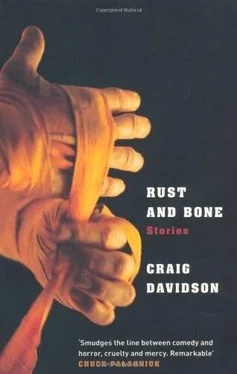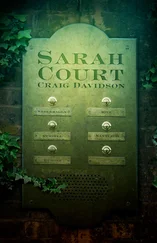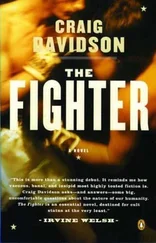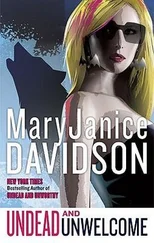“Gil,” she says, “introduce me to your friend?”
“Friend?” says Gil. “Just met him.”
She says, “Heidi Giroux.”
“Ben Jones. Nice to meet you.”
Heidi smiles again, making me think of a girl I’d treated shabbily. You rotten-ass bastard were her last words to me. We broke up over the phone, two thousand kilometers between us and the insult didn’t register, didn’t sting. In fact, I liked the sound of it, the way it tripped off her tongue. You rotten-ass bastard .
An utter shipwreck of a human being shambles to the podium. He appears to be composed entirely of diverse plastics and latexes, wood, possibly carpenter’s putty. A pincer-like mechanism constitutes his left hand. His right leg is a tapered peg. I’m unsure whether his state is the result of a single catastrophic accident or a series of unrelated minor misadventures. A horrendous farming mishap? A fraternity prank gone horridly awry? The mind reels. He speaks in gulps and gasps, sentence fragments clearing his lips in a metronomic, hypnotic cadence.
“There were times … I thought … why not just … end it? But with the love … and support … of my wife … my kids … the grace … of God … I go on. What else … can anyone … do?”
The man cries. We applaud. Mingle. Disperse.
Afterwards Heidi and I sit on the gate of Gil’s Chevy Sierra while he hunts the glovebox for rolling papers. To the south, down a soft slope, night waves lap the shores of Martindale Pond, slapping the hulls of tethered rowing skulls. By the domelight’s glow, I see Heidi is not entirely armless: a pair of stubs project from her smoothly sloped shoulders. She smells of vanilla perfume, a brand favored by high-school girls.
Gil materializes bearing a joint of herculean proportions. He sparks the tip and sets it in the crook of Heidi’s mouth. She takes a decidedly unladylike toke, expelling bluish smoke through her nose.
“Himalayan Gold,” Gil says. “Buy it from a guy in Texarkana and smuggle it over the border in a box of clementines. Drug dogs can’t sniff it.”
Gil plucks the joint from Heidi’s mouth, takes a hit, passes it. Potent stuff: a shiny metallic bubble expands inside my skull, dense and bright with colors. Cars pass on Main Street, the growl of motors swelling, receding. From Old Port Dalhousie comes the intermittent screech of teenagers scarring the tarmac in juiced-up musclecars. A mosquito hums against Heidi’s neck. I slap it. “One here, too,” she says, eyes falling to her chest, where another mosquito rests on the comfortable swell of her breast. What the hell—slap that fucker, too.
“Do you ever think about it?” Gil’s weaving side to side. “Karma?”
“Gil,” Heidi says, “please.”
“No, I’m serious. Not saying I deserved this, exactly—who deserves to get their arm tore off, right? Then again, maybe I did. Sit and think on it awhile and you realize, yeah, of course you deserve it— conceivably . Some unkindness or cruelty or selfishness, doing the wrong thing when the right thing was too hard or didn’t suit your purposes, hurting someone just for the rip of it, ’cause it made you feel like a big man. Great Wheel of Karma, man. All comes around.”
“I call it bullshit, Gil. Pure bullshit.”
Gil shrugs, unfazed at my skepticism. “When something awful happens to you, can you chalk it up to bad luck, crossed stars, wrong place, wrong time? Not me. As a human being, you’ve got to believe there’s a reason . Catted around on my wives, wasn’t always there for my kids. A tiger shark took my arm thirty yards off the white sand beaches of Indian Rocks. A bit harsh, sure, but all things seek balance. Tit for tat. Did I deserve it? Could be I did.”
“You can’t possibly believe that.”
“Why not? Comforting, in a way. Square your debt and start again, fresh.”
“It’s ridiculous. What about all the people who suffer horribly for no reason? What about …” Cock a thumb at Heidi. “… her?”
“You don’t know what I deserve,” she says. “You don’t know me at all.”
“Okay, okay, then what about … starving children? What about kids born with warped spines, or … or retards . Explain them.”
“Not claiming it’s an easy theory to defend. Just my belief.”
“Yeah, well, it’s the stupidest fucking thing I’ve ever heard.”
Gil raises his artificial hand to his lips. The roach glows between those yellow fingertips, blistering the plastic. “A few years ago, this elephant, Tyke, was killed by the Toronto police. A performing elephant, right, with a traveling circus? Got loose after a show. Cops boxed it in with their patrol cars and opened fire. It hadn’t hurt anyone, but I guess it could’ve. Took two hundred rounds to put the thing down. They shot it in the trunk and belly, its ears and face, trying to put a slug in its brain but its skull was so thick the bullets were driven flat. I remember blood on that gray skin—so much blood. It went down on its front knees, head bowed like it was surrendering. The cops reloaded and kept shooting.”
“So what?” An intense rage gathers, only slightly offset by the mellowing effect of the dope. “What the fuck does that have to do with anything?”
“So who’s to blame?” Gil says. “The cops? They were doing their job. Tyke? Scared, mistreated animal. What I’m saying is, when I saw the photo of you in the paper I thought of that elephant shot to death on the street. Karma, man. Universal and everlasting.”
“What are you talking about? I had nothing to do with that. You don’t know the first thing about me .”
“Don’t know nothing about nothing, man. Speculation, is all. I gotta go.”
He climbs into the truck, keys the engine. The final bars of Warren Zevon’s “Werewolves of London” rattle from the truck’s stereo. Rolling down the window, he waves goodbye with his fake hand, pulling away.
“Go … fuck! ”
Taillights brightening, the truck slows. I ball my hands into fists, loosening them only when Gil gooses the gas pedal and turns onto the street.
“What an ass hole.”
“He gets that way when he’s high,” says Heidi.
“Are you two close?”
“We smoke up after the meetings. I guess we’re friends.”
“Whatever. I’m leaving.”
“Give me a lift?”
“I drove my bike, and I’m pretty high. Might kill us both.”
“Who cares?”
“The depth of your nihilism shocks me.”
HEIDI LIVES outside Welland, a township near the Merritville Speedway. When I was a kid my father took me to the Speedway to watch Baja buggies tear around a dirt oval, nitrous oxide funnycars, demolition derbies. I remember the cool autumn air thickened with stirred dust, Dad buying beer for himself, Orange Crush for me. I drive slow down back roads, taking it easy on the curves. Heidi leans against the backrest, powerful legs wrapped around my waist. Midges and moths splatter the helmet’s faceshield. The soft heat of Heidi’s body, her breath on the hairs of my neck.
The house sits at the base of a wooded valley. Pickup trucks in the blacktopped drive. Smells: woodsmoke and pinesap. Sly noises in the fringing trees: raccoons, maybe spring turkeys.
Heidi slides off the seat. “Sit a minute?”
She leads me to a wicker swing on the porch. A motion-sensor halogen snaps on and I note, in that stark sudden light, just how beautiful—and how young—she is. My prosthetic leg collides with a porch rail and she says, “Shshsh. You’ll wake my folks.”
We sit on the swing. Heidi’s body presses close to mine. I know nothing about this girl: her age, her hat size, if she is an honorable person, whether she’s ever been happy and in love. It’s been this way many times before, anonymous and meaningless, but what once seemed ideal now fills me with a profound melancholy.
Читать дальше












